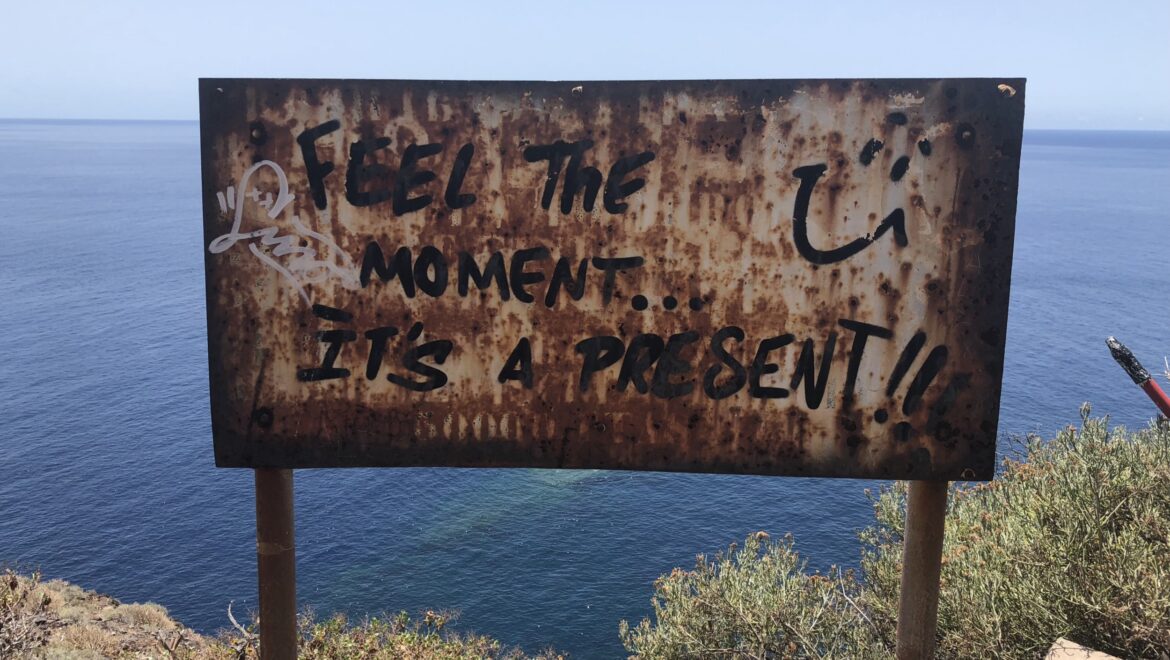Tomorrow is December 1st. That means the holiday season is upon us. For too many of us Earthlings that reality brings a twinge, or more, of anxiety and dread.
Buying presents, flying to see family or hosting them, eating way too much at way too many parties…it gets overwhelming for many. To the point that people get depressed this time every year.
It doesn’t have to be that way. With a modicum of planning and effort, we can beat these holiday blues. Here are four ways to do just that.
1. Nip the self-fulfilling prophecy of doom in the bud with a big dose of mindfulness.
This one is head-and-shoulders the most important. Because here is what most people do when the holidays arrive. First, they say to themselves, “Ugh. The holidays are here. I hate this time of year. Time to feel miserable.”
Then the first little mishap occurs, “Dang it. I don’t have one good family photo for our holiday card. I hate this time of year.” Does it help to react this way?
NO!
NO!
NO!
I would venture to say that the number one reason people hate the holidays is because they tell themselves they hate the holidays. Then they commit arguably the most injurious spiritual crime of all: They look out to the entire month of December, PREDICT how bad things will be, then stuff all that future-feeling-poison into themselves…on December 1!
So what is the antidote to this self-sabotage, future poison feeling psychodrama? Remain in the present. Take everything one moment, one day at a time.
So do your best to take one thing at a time. Resist the temptation to stack up all the potential stresses in the days and weeks ahead and stuff them down your throat which will only make you an anxious, depressed mess.
How would that play out with the holiday card meltdown? Maybe you say, “Okay. I’ll just take a picture of the family before dinner tonight. I don’t need some Annie Leibovitz, high brow photo. Problem solved.”
Start NOW
The key to this whole idea is starting early, like NOW, in not allowing yourself to capitulate to the supposed misery of the holidays. We keep our attention, as best we can, in the here and now and take one thing at a time.
And anytime some holiday-themed problem emerges and we feel ourselves going to that place of “Man, I hate this time of year,” just STOP. Look around. Then ask yourself, “Is there anything all that terrible going on in this moment in front of me? No. I’m in my kitchen making coffee. That’s it.” Then go on.
I’m telling you, if you look at what happened during the moments of your holiday seasons past, they wouldn’t add up to misery. The misery is caused by all the ruminating and future casting and kvetching about what might be or what has been.
So start TODAY on this. Nip the self-fulfilling “I hate the holidays because I’ve always hated the holidays” mind poison in the bud.
One thing at a time. Stay in the now.
2. Express your expectations and limitations to those close to you NOW.
This one is mostly for the moms out there who, let’s face it, bear the biggest brunt of holiday responsibilities. They do most of the gift-buying, decorating and all the rest.
Why do they do this? Because most moms, at least the ones I know, feel responsible for making everyone happy, especially in their own family. This is where all the holiday pressure comes from. I’m not saying that’s a good or bad thing. It’s just my observation.
A big driver of this pressure-filled holiday season comes from the fact that there’s no plan. December comes and then, slowly but surely, chaos and anxiety take over.
Make a plan
So how about this to alleviate all that suffering? How about sitting down with a pen and paper and thinking through how YOU would like the holidays to go? Think about what you are willing to do.
Maybe instead of getting four presents for each of your four kids, you get one each and maybe give them some cash to get what they want. I know that might be heresy for some of you.
The point is to think the whole season through. Look back on what has caused you the most stress in previous years and see if you can do something to mitigate it this year.
THEN you have to do something even more important: Communicate that plan to your family. NOW! Maybe they’ll push back on some things, but you work that out.
The key is that after that conversation you are all on the same page. I think a huge amount of mom-stress stems from amorphous, undefined expectations they feel everybody has of them. Getting those expectations more crystallized will cut out a ton of stress.
3. Take care of yourself.
This one seems obvious but deserves attention. Stressful periods are NOT the time to abandon ourselves.
So how does that manifest? Exercise more, not less, during the holidays. Get those endorphins running through your veins. We all tend to eat too much during the holidays and regular exercise will make us feel less bloated and out of control.
If you’re not a big exercise fan, get out and walk. Thirty minutes at least, if you’re able. EVERY DAY.
If you normally get one massage per year, get two, at least, in December! Yes, it’s expensive, but so worth it.
Find some quiet time every day
Find some time every day to be alone and quiet. Hopefully, for at least half an hour. Away from the crowds, the kids and all the holiday madness.
Ideally, I’d say meditate. Nothing would do more to calm and soothe you than meditation.
Those are just a few ideas. The key is to ask yourself: What can I do to be good to myself this holiday season? Do this NOW, not in mid-December when all hell has already broken loose.
4. Have a strategy for dealing with your relatives.
We tend to be around extended family during the holidays, which is a huge source of stress for many. Whether it’s in-laws or your parents or uncles or siblings, there’s always some emotional baggage lurking within.
My approach for dealing with relatives comes straight from the Eckhart Tolle playbook. He recommends a two-pronged strategy for dealing with difficult people.
First, recognize that we are all at different stages in the awakening process. Some people are thoroughly unconscious and tough to deal with. That’s where they are and you aren’t going to change them. It’s not your responsibility. So step number one is to accept people as they are, warts and all.
Second, if you find yourself in an uncomfortable or tense situation, immediately train your attention on your breathing. Take long, slow, deep breaths. And do your best to remain present. Don’t allow your egoic, lower self to hijack your plane and fly into the realm of, “Listen, you sonofabitch, I’ve taken this crap from you for twenty years. No more!”
Don’t do it! I know, it’s hard. But keeping those two points top of mind — accepting people for who they are and staying present — will make it far easier.
The takeaway
So there you have it. Four things you can do at the START of the holiday season to save yourself a ton of stress.
And here’s the thing. You may not get everything perfectly right this year. But you’ll learn what worked and what didn’t. And then next year you’ll do better. And the year after that will be even better.
Who knows? You might even look forward to the holidays before too long.










